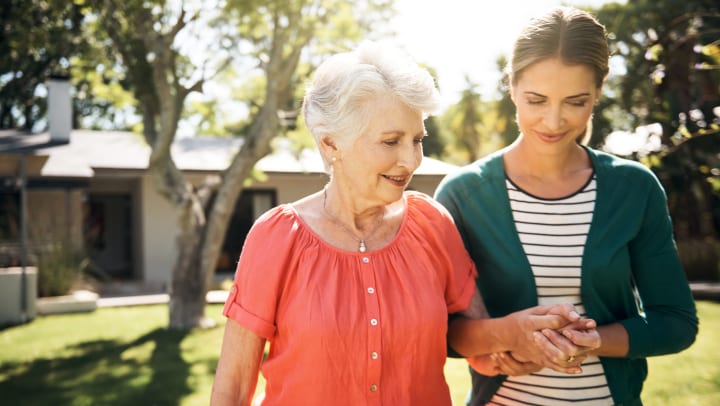When an older adult you care about receives a diagnosis of Alzheimer’s disease, the entire family can feel fear, anger, and uncertainty. Family members often worry about what to do next or if they will be able to manage their loved one’s care.
In honor of National Alzheimer’s Month, held annually in November, we share this advice for caring for a loved one with the disease.
Caring for a Senior Loved One Who Has Alzheimer’s Disease
First, take time to educate yourself and other family members about the disease. Doing so will better prepare you for the caregiving road ahead. The Alzheimer’s Association has created a resource designed to make that easier. Inside the Brain will help you understand how Alzheimer’s disease impacts the brain and body.
Part 2 of Inside the Brain will teach you more about what your loved one may need at each stage of the disease. For example, in the earliest stages of Alzheimer’s, an older adult may be able to maintain most of their independence. But they might require assistance with time-bound tasks, such as paying bills, taking prescription medications, and attending appointments.
As the disease progresses, their need for assistance with personal care (bathing, grooming, dressing) and activities of daily life will increase. It’s essential to learn more about the options for support, such as in-home care or a memory care community, before you need them. This not only helps you prepare for the future but can also act as a backup plan in case the primary caregiver falls ill or has an emergency of their own.
Conduct a Home Safety Evaluation
Another issue that you’ll want to address early is the safety of the senior’s residence. The best way to do that is by conducting a thorough home safety evaluation. It can help you identify potential hazards to address, such as uneven stair treads that could be a fall risk or lack of grab bars near the shower. If you are unsure how to conduct one, talk with the senior’s primary care physician. They can recommend a physical or occupational therapist to assist.
The home safety assessment should also include the home’s security system. If there isn’t one in place or it doesn’t have an emergency call component, an upgrade may be necessary.
Typical Alzheimer’s Caregiver Tasks
As a loved one’s Alzheimer’s progresses, caregivers often take on increasingly complex responsibilities including:
• Helping with personal care needs, such as bathing, grooming, and dressing
• Assisting with toileting and continence care needs
• Creating a system for managing and administering medications
• Monitoring changes in the senior’s health and updating their physician
• Preparing healthy meals that are easy to eat if coordination is impaired
• Scheduling medical appointments and follow-up care, and providing transportation
• Planning meaningful daily activities, such as music, arts, and crafts
Some families are able to manage these tasks at home until the later stages of the disease. Others find that a memory care community helps their loved one enjoy the best quality of life at each stage of the disease.
Clearbrook Memory Support at Clearwater Living Communities
In our Clearbrook Memory Support neighborhoods, we recognize the importance of caring for the older adult and their loved ones. We take a holistic approach that benefits the entire family. The best way to learn about our innovative memory care neighborhoods is to visit one in person.
Call the Clearwater Living community nearest you to set up a time for a private tour!

